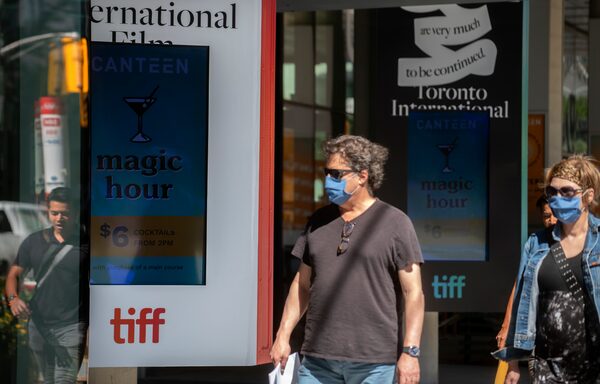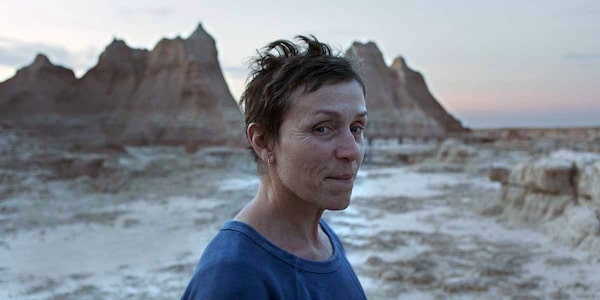
The TIFF Bell Lightbox on King St. West in downtown Toronto is seen on Aug. 31 2020.Fred Lum/The Globe and Mail
Plan your screen time with the weekly What to Watch newsletter. Sign up today.
Because I’m a freak, back in February I started work on what’s become an annual tradition in the Hertz household: combing through studio release dates and industry news sites to compile a list of which big prestige-y fall movies might be dominating the Oscar race. Specifically which films had a good chance of premiering at the Toronto International Film Festival, which has long built its brand as the starting line of the Oscars race.
The strategy has worked out pretty well for TIFF so far: Last year’s edition helped launch eventual Academy Awards champions Parasite, Joker, Judy, Marriage Story and Jojo Rabbit, the latter of which won the festival’s People’s Choice Award, which has become an unofficial Oscar bellwether. If you want to know which movies audiences will be talking about for the last half of the year and the first half of the next, TIFF is your first destination for discourse.
Naturally, my efforts went straight into the fiery dumpster we call reality once COVID-19 wiped away any semblance of movie-industry normalcy. No studio wants to put an exact date on their best-chance Oscar films this season, lest theatres are shuttered again and they have to rework their expensive marketing plans. But what does this erasure mean for TIFF?
TIFF 2020: The Globe's guide to everything you need to know about this year's festival
The festival may still have a People’s Choice Award (though minus its regular sponsor Grolsch), but thanks to this unsteady era, coupled with the Academy of Motion Picture Arts and Sciences’ decision to push its 2021 Oscars ceremony two months later than planned to April 25, this year’s TIFF programming has the potential to reshape just what TIFF is. Or what it should be.

Actor-director Regina King’s historical what-if tale One Night in Miami, based on Kemp Powers’ play, is a fictionalized account of a 1964 meeting between Malcolm X, Muhammad Ali, Sam Cooke and Jim Brown.Courtesy of TIFF
For starters: Look at the titles garnering the most press in advance of TIFF’s Thursday night kickoff: the Frances McDormand drama Nomadland, the Kate Winslet-Saoirse Ronan romance Ammonite, Viggo Mortensen’s father-son drama Falling, the Olivia Colman-Anthony Hopkins drama The Father, and Regina King’s historical what-if tale One Night in Miami. These are films headlined by awards-friendly talent, backed by Oscar-calibre distributors. Assuming that the Oscars go ahead, TIFF should still have viable contenders to boast about come podium time.

Frances McDormand drama Nomadland explores the vast landscape of the American West, in Chloé Zhao’s wise and intimate portrayal of life as a modern-day nomad.Courtesy of SEARCHLIGHT PICTURES/Courtesy of TIFF
But once you get away from the obvious suspects – and a typical year sees as many as five times 2020′s amount of supposed sure bets – this year’s slimmer TIFF slate contains as many question marks as exclamation points.
Thanks to gun-shy studios keeping their distance – Warner Bros., for instance, had five titles at last year’s festival including Joker and Just Mercy, but zero this time around – a good portion of this year’s films are sales titles (i.e., films that don’t yet have a distributor attached). Movies such as the Idris Elba-led Concrete Cowboy, the Mark Wahlberg drama Good Joe Bell, and Halle Berry’s directorial debut Bruised (which is screening as a “work-in-progress”) are playing Toronto in the hopes of scoring a deal. Some may make it out of the festival with release plans in place. Some may disappear forever. TIFF is usually filled with such gambles. But this year, the stakes seem especially high.
This uniquely 2020 dilemma could have been solved if Netflix, the one studio that’s been regularly releasing movies this year, participated in TIFF. But instead, the streaming giant decided to sit out the fall festival circuit entirely. If Netflix’s forthcoming features Hillbilly Elegy, Ma Rainey’s Black Bottom, Mank and The Midnight Sky end up netting Oscar gold – and sucking up all the cultural oxygen that goes along with such a feat – then TIFF will be left out of the conversation.

Viggo Mortensen’s father-son drama Falling is the story of a gay man on a patience-testing mission to care for his ailing, solitary and homophobic father played by Lance Henriksen.1996-98 AccuSoft Inc., All rights reserved/Courtesy of TIFF
But a lack of expectations has its benefits. This year more than ever, audiences can focus on two areas of the programming that are traditionally drowned out by the din of Oscar buzz: documentaries and Canadian titles. In the former category, there is a wealth of potential, including City Hall from legendary documentarian Frederick Wiseman, The Truffle Hunters and 40 Years a Prisoner, to name a few. The homegrown slate, meanwhile, looks so promising and eclectic – Michelle Latimer’s Inconvenient Indian, Charles Officer’s Akilla’s Escape, Emma Seligman’s Shiva Baby – that you might not even realize it was put together in a pandemic.
Perhaps these long-time TIFF strengths – documentaries, Canadian film and under-the-radar international fare – should be the building blocks of the organization’s future. If TIFF can no longer rely on Hollywood, then it should simply rely on itself.
The 45th edition of the Toronto International Film Festival runs Sept. 10-19 (tiff.net)
 Barry Hertz
Barry Hertz